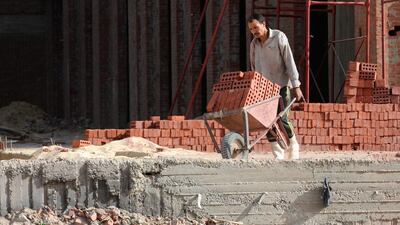Seif Fikry was the head of institutional sales and trading at Egypt’s largest investment bank, EFG-Hermes, when the country’s shares were incorporated into MSCI’s Emerging Markets Index in May of 2001.
“We didn’t have the same amount of passive investors or exchange-traded funds as we do today,” Mr Fikry said. “We had more of managed funds, where the manager had the call to go underweight, overweight or exclude the whole index from his portfolio.”
But even then, the liquidity from passive investors – tracker funds and ETFs – into emerging markets was nowhere near today’s US$1 trillion, according to EPFR Global, a Boston-based fund tracker.
Earliest data from EPFR from 2003 shows $1 billion worth of passive investment into emerging markets, highlighting how much the industry has grown in recent years.
Traders, brokers and fund managers that are awaiting shares of the UAE and Qatar to be incorporated next month into MSCI’s Emerging Markets Index, say the Arabian Gulf states are at an advantage over their North African predecessors.
“They are far more liquid and the growth potential is far higher for Abu Dhabi, Dubai and Qatar, which makes the story more interesting for those two countries – not to mention better fundamentals, GDP growth, balance of payments and level of debt,” said Sebastien Henin, the head of asset management at The National Investor, an Abu Dhabi-based boutique investment bank. “These are a lot of things that might look very appealing for investors.”
Mr Fikry said that even after the inclusion, foreign investors expressed hesitation because of Egypt’s financial difficulties. But new money did begin to flow in.
“The day of the inclusion was a non-event, but a few months later we saw funds that never looked at the country had started to put money into action,” said Mr Fikry, who serves as the chief executive for the Egyptian lender for the GCC excluding Saudi Arabia.
At the time, the country had descended into a bear market after a global recession cut income from tourism, oil and the Suez Canal, taking a toll on the North African state’s budget deficit and balance of payments.
To the east, Asian economies were rebounding strongly after reeling from their own financial crisis in 1997.
“They used to tell me if Egypt’s government gets its act together it will be the new tiger on the Nile,” said Mr Fikry, referring to the “Asian tigers”, the top performing economies of Singapore, Hong Kong, South Korea and Taiwan.
The Abu Dhabi Securities Exchange General Index has risen 17.5 per cent so far this year, trading at 5,045.01 points. The Dubai Financial Market General Index has surged 57.3 per cent in the same period, trading at 5,302.09 points. In Qatar, the benchmark has risen 27.6 per cent to 3,302.65.
Property and banks, whose shares make up most of the weighting on their respective indices, are enjoying a fresh cycle of investment and surge in asset prices and financing. Oil revenue has triggered government spending in infrastructure, igniting new projects and buoying the private sector. The inclusion should bring $739m worth of foreign inflow to the two countries, according to forecasts by EFG-Hermes.
To entice passive funds, Abu Dhabi’s stock market introduced a closing auction session in 2012 – when the UAE was vying for an upgrade. It hoped to enable ETFs and other passive managers to easily buy and replicate the emirate’s benchmark. The idea was to encourage further foreign investment.
Passive investors and ETFs tend to avoid the day’s trading session and instead await the closing auction to introduce all their orders with no limitation on price. The priority is attaining the right quantity of shares. Without a closing auction, buying shares to replicate the index can be very complicated.
“We previously had a weighted average index, but it had its own limitations – for example, it reduced volatility,” said Rashed Al Baloushi, the chief executive at Abu Dhabi Securities Exchange. “But it wasn’t a very accurate picture of the overall trading session, so we started to think out of the box and look among developed economies. We found the closing auction – which includes pending and entered trades in the last 10 minutes – the more accurate. Today there are several bourses asking us for support to replicate our method. For international firms, this method was preferred because it is more realistic.”
The Dubai Financial Market is understood to be considering a closing auction as well. DFM did not reply to requests for comment last week.
In Morocco, the scenario was not very different to that of Egypt. For Mr Henin, who was then a proprietary trader at CFG Group, which was then the biggest independent investment bank in the country, the amount was not “meaningful”.
“Most active fund managers did not bother to scratch their head to see where there were opportunities to invest,” Mr Henin said.
halsayegh@thenational.ae
Follow us on Twitter @Ind_Insights

